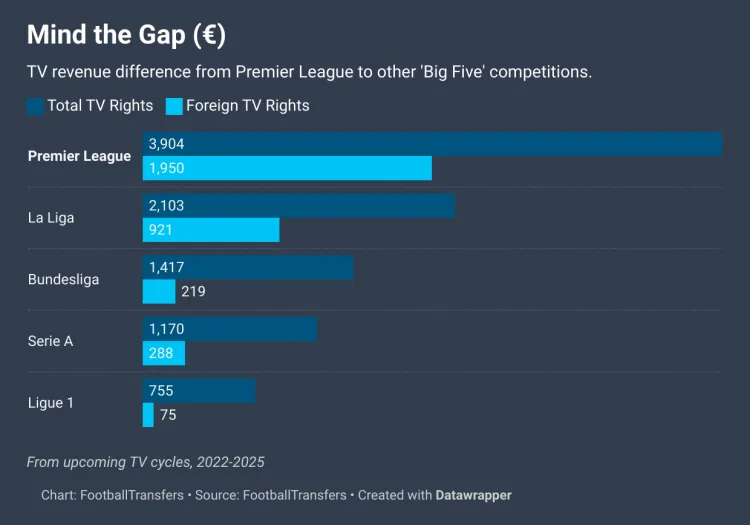
The English Premier League's financial dominance within European football has become a topic of intense scrutiny and debate. As the league's revenue streams continue to swell, nearly doubling those of both La Liga and the Bundesliga, the ripple effects across the continent are profound. This financial might not only allows English clubs to attract top-tier talent but also to invest heavily in infrastructure, further widening the competitive gap with their European counterparts.
Premier League's Financial Juggernaut
The Premier League's financial clout is a multifaceted phenomenon, driven by lucrative broadcasting deals, commercial partnerships, and global brand appeal. According to a financial report from The Guardian, the Premier League's revenues are nearly twice those generated by La Liga and the Bundesliga, creating a vast economic gulf that is reshaping the landscape of European football.
The broadcasting rights, both domestic and international, form a significant portion of this revenue. Sky Sports, BT Sport, and Amazon Prime Video are among the key players in the UK, while international distribution reaches countless fans worldwide. This extensive coverage not only elevates the league's profile but also translates into substantial financial returns for the clubs.

Talent Magnetism and Transfer Market Disparity
The Premier League's financial prowess enables its clubs to dominate the transfer market, often outbidding other European clubs for marquee players. The ability to offer higher wages and better facilities makes the league an attractive destination for some of the world's finest talents. This inevitably leads to a concentration of top players within England, skewing the competitive balance across Europe.
For instance, Manchester City, Liverpool, and Chelsea have become synonymous with high-profile signings, often luring players away from traditional European powerhouses like Real Madrid and Bayern Munich. The financial muscle of these clubs allows them to not only sign top players but also retain them with lucrative contract extensions, a luxury not always afforded to clubs in other leagues.
The Impact on European Competitions
The Premier League's financial dominance has significant implications for European competitions such as the UEFA Champions League and Europa League. English clubs, with their deep squads and financial backing, are often better equipped to compete on multiple fronts, leading to frequent representations in the latter stages of these tournaments.
However, this financial disparity raises questions about the competitive integrity of European competitions. While the Champions League is designed to pit the best against the best, the financial imbalance means that clubs from less wealthy leagues face an uphill battle. This has prompted discussions around potential regulatory measures to ensure a level playing field. Proposals such as salary caps and stricter financial fair play regulations have been tabled but remain contentious.
Infrastructure and Youth Development
The financial windfall enjoyed by Premier League clubs is not solely spent on player acquisitions. Significant investments are also made in infrastructure, including stadium upgrades and state-of-the-art training facilities. These improvements not only enhance the matchday experience for fans but also provide players with the best possible environments to thrive.
Moreover, the emphasis on youth development cannot be overlooked. Premier League clubs are investing heavily in their academies, nurturing the next generation of talent. Clubs like Manchester United and Chelsea have a history of producing homegrown stars, and with increased financial resources, their youth programs are more robust than ever.
Sustainability and the Path Forward
As the Premier League's financial clout continues to grow, questions about sustainability and the long-term implications for European football arise. The league's commercial success may be celebrated, but the potential for financial disparity to widen further is a legitimate concern.
Regulatory bodies, including UEFA, are faced with the challenge of crafting policies that ensure fair competition while respecting the commercial freedoms of clubs. The introduction of the UEFA Financial Fair Play regulations was a step towards financial equilibrium, but its effectiveness has been questioned. To address these concerns, a more nuanced approach that considers the unique financial landscapes of different leagues may be required.

Conclusion
The Premier League's financial dominance is a testament to its global appeal and commercial acumen. However, the implications for European football are complex and multifaceted. As English clubs continue to lead in revenue generation, attracting world-class talent, and investing in top-tier infrastructure, the gap between the Premier League and other European leagues is likely to remain a critical topic of discussion.
The future of European football may hinge on finding a balance between financial success and competitive fairness. Whether through regulatory changes or innovative financial models, the objective must be to preserve the integrity of the beautiful game, ensuring that it remains a captivating spectacle for fans worldwide.